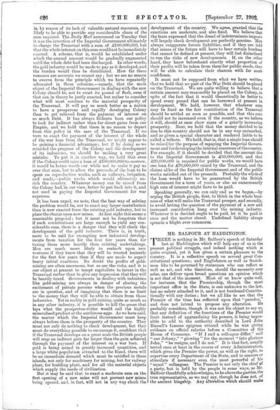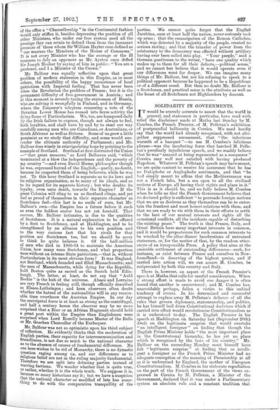MR. BALFOUR AT HADDINGTON. T HERE is nothing in Mr. Balfour's
speech of Saturday last at Haddington which will help any of us in the present political struggle, and indeed nothing which is quite original, yet it has given a certain pleasure to the country. It is a reflective speech on several great Con- stitutional questions ; and Englishmen as well as Scotch- men like to be governed by statesmen who can reflect as well as act, and who therefore, should the necessity ever arise, can deliver upon broad questions an opinion which is not that of the moment. Most of us know quite well, for instance, that the Premiership, though the most important office in the State, is one unknown to the law, has no salary attached to it, and is not burdened Constitu- tionally with any duties ; but we all like to see that the Premier of the time has reflected upon that " paradox," and does not intend to propose any alteration. He probably considers, though it was not his object to say so, that any definition of the functions of the Premier would limit instead of aggrandising his powers, it being impos- sible to add to the authority described in Lord. John Russell's famous epigram uttered while he was giving evidence on official salaries before a, Committee of the House of Commons. "If I and a colleague differ," said " our Johnny," " glowing " for the moment " into glorious John," "he resigns, and I do not." It is that fact, usually tested once at least in the course of every Administration, which gives the Premier the power, as well as the right, to supervise every Department of the State, and to censure or stimulate if necessary even the most powerful of his " equal " colleagues. The Premier is not only the chief of a party, but is held by the people in some ways, as Mr. Balfour thankfully acknowledges, to be above the parties, the true representative, as we may say, though he does not of the ancient kingship. Any alteration which should make other Ministers, who under our free system need all the prestige they can retain to defend them from the incessant pressureof those whom Sir William Hayter once defined as " our masters the Members of the House of Commons." It is not every Minister who has the courage or the ill manners to defy an opponent as Mr. Ayrton once defied Sir Joseph Hooker by saying of him in public ; " You are a gardener, and I a Minister of the Crown." Mr. Balfour was equally reflective upon that great problem of modern statesmen in this Empire, as in most others, the possibility of the happy coexistence of local patriotism with Imperial feeling. That has never been since the Revolution the problem of France; but it is the permanent difficulty of free government in Austria; and at this moment is severely taxing the statesmen of Russia, who are solving it wrongfully in Finland, and in Germany, where the Emperor's telegram censuring a vote of the Bavarian Lower House has roused into fierce activity the dying flame of Particularism. We, too, are hampered daily by the Irish failure to express, though not always to feel, both loyalties, and shall have by and by to steer our way carefully among men who are Canadians, or Australians, or South Africans as well as Britons. Some of us grow a little pessimist as we study that difficulty, and some would sur- render the ultimate authority of Parliament ; and Mr. Balfour does wisely in reinvigorating hope by pointing to the example of Scotland. Scotland at first distrusted the Union —" that great measure," as Lord Belhaven said, " which terminated at a blow the independence and the poverty of my country "—and even David Hume, philosopher though he was, expressed hatred of the English,—partly, no doubt, because he suspected them of being believers, while he was not. To this hour Scotland is separate as to its laws and its religious organisation, as to many of its ideals, and as to its regard for its separate history ; but who doubts its loyalty, even unto death, towards the Empire? If the great Colonies will cling to us as Scotland clings, and yet feel as proud of themselves in their separate character as Scotchmen feel—this last is no smile of ours, but Mr. Balfour's own—the Empire has a future before it such as even the boldest orator has not yet foretold. That success, Mr. Balfour intimates, is due to the qualities of Scotchmen. It is a natural explanation to be offered by a Scot to Scotchmen, and at Haddington, and to be strengthened by an allusion to his own position and to the very curious fact that his rivals for that position are Scotchmen too, but we should be sorry to think he quite believes it. Of the half-million of men who died in 1860-64 to maintain the American Union, how many were Scotchmen, and what proportion were without an intense State patriotism,—that is, without Particularism in its most obvious form ? It was England, not Scotland, which founded and filled Massachusetts; and the men of Massachusetts, while dying for the Republic, hold Boston quite as sacred as the Scotch hold Edin- burgh. The latter, at least, do not say that "Auld Reekie " is the hub of the universe. Alsace and Lorraine are very French in feeling still, though officially described as Elsass-Lothringen ; and keen observers often doubt whether the hatred of the nationalities will in any reason- able time overthrow the Austrian Empire. In our day the centripetal force is at least as strong as the centrifugal, and half a century hence the observer may be no more surprised that a Boer or an African Huguenot should hold a great post within the Empire than Englishmen were surprised when Lord Romilly became Master of the Rolls or Mr. Goschen Chancellor of the Exchequer. Mr. Balfour was not so optimistic upon his third subject of reflection. He evidently thinks that the moderation of English parties, their capacity for intercommunication and friendliness, is not due so much to the national character as to the absence of causes of fundamental difference. No one here wishes to be rid of Monarchy, there is no dynastic question raging among ts. and our differences as to religious belief are not in the ruling majority fundamental. Therefore we are split into debating parties instead of warring factions. We wonder whether that is quite true, or rather, whether it is the whole truth. We suppose it is, because so many historians say it; but we have a suspicion that the national character as modified of late has some- thing to do with the comparative tranquillity of the of the office a " Chancellorship " in the Continental fashion parties. We cannot quite forget that the English would only stiffen it, besides depressing the position of all Jacobites, once at least half the nation, never seriously took up arms ; that the emancipation of the Roman Catholics, Which was detested by a majority of the people, created no serious rioting ; and that the transfer of power from the aristocracy to the democracy was effected without artillery having ever been called into play. " Your people," said a German gentleman to the writer, " have one quality which makes up to them for all their defects,—political sense," and we cannot but believe that it would operate even if our differences went far deeper. We can imagine many things of Mr. Balfour, but not his refusing to speak to a political opponent because he happened to be a Republican or of a different creed. But then no doubt Mr. Balfour is a Scotchman, and practical sense is the attribute as well as the boast of all Scotchmen not Highlanders by descent.











































 Previous page
Previous page